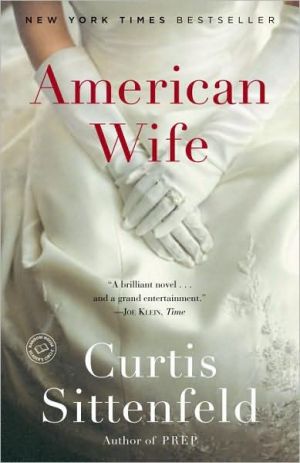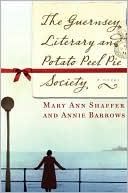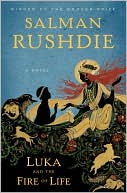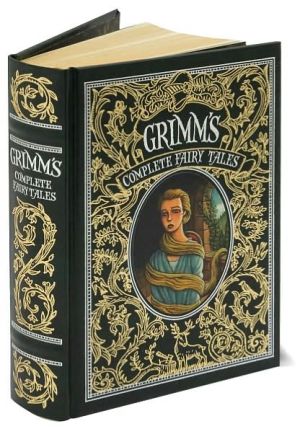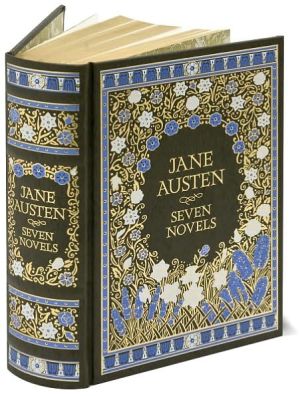American Wife
A kind, bookish only child born in the 1940s, Alice Lindgren has no idea that she will one day end up in the White House, married to the president. In her small Wisconsin hometown, she learns the virtues of politeness, but a tragic accident when she is seventeen shatters her identity and changes the trajectory of her life. More than a decade later, when the charismatic son of a powerful Republican family sweeps her off her feet, she is surprised to find herself admitted into a world of...
Search in google:
On what might become one of the most significant days in her husband s presidency, Alice Blackwell considers the strange and unlikely path that has led her to the White House and the repercussions of a life lived, as she puts it, almost in opposition to itself. A kind, bookish only child born in the 1940s, Alice learned the virtues of politeness early on from her stolid parents and small Wisconsin hometown. But a tragic accident when she was seventeen shattered her identity and made her understand the fragility of life and the tenuousness of luck. So more than a decade later, when she met boisterous, charismatic Charlie Blackwell, she hardly gave him a second look: She was serious and thoughtful, and he would rather crack a joke than offer a real insight; he was the wealthy son of a bastion family of the Republican party, and she was a school librarian and registered Democrat. Comfortable in her quiet and unassuming life, she felt inured to his...The Barnes & Noble ReviewA word of advice before reading American Wife: put Laura Bush firmly out of your mind. While bestselling author Curtis Sittenfeld has waxed rhapsodic about her admiration for the first lady, she insists that in this novel, her most ambitious work to date, protagonist Alice Blackwell is most certainly not Laura Bush. Sittenfeld has conceded that she drew on some major events in Mrs. Bush's life, such as the horrific car accident that killed a fellow student in high school and her marriage to a man who is eventually elected president and steers the country into a controversial war. The rest, she says, she invented within the framework of that reality. This is where it helps to forget everything you know about the first family, for what waits to be discovered is not just a gossipy roman à clef. Instead, readers will find a story that unfolds like life itself: with small moments illuminated in high relief and milestones almost blurred by their great significance, as well as a host of characters with real meat on their bones. But what really sets this novel apart is a subtle but insistent question that begs reflection throughout the story. As American Wife juxtaposes the intimacies of marriage with larger-than-life public personas, and personal values with party politics, Alice wonders, "How much is at stake when you decide something?" Though she's addressing her husband, there is a sense she's asking herself, and the reader, the very same thing. --Lydia Dishman
PART I\ 1272 Amity Lane \ In 1954, the summer before I entered third grade, my grandmother mistook Andrew Imhof for a girl. I’d accompanied my grandmother to the grocery store—that morning, while reading a novel that mentioned hearts of palm, she’d been seized by a desire to have some herself and had taken me along on the walk to town—and it was in the canned-goods section that we encountered Andrew, who was with his mother. Not being of the same generation, Andrew’s mother and my grandmother weren’t friends, but they knew each other the way people in Riley, Wisconsin, did. Andrew’s mother was the one who approached us, setting her hand against her chest and saying to my grandmother, “Mrs. Lindgren, it’s Florence Imhof. How are you?”\ Andrew and I had been classmates for as long as we’d been going to school, but we merely eyed each other without speaking. We both were eight. As the adults chatted, he picked up a can of peas and held it by securing it between his flat palm and his chin, and I wondered if he was showing off.\ This was when my grandmother shoved me a little. “Alice, say hello to Mrs. Imhof.” As I’d been taught, I extended my hand. “And isn’t your daughter darling,” my grandmother continued, gesturing toward Andrew, “but I don’t believe I know her name.”\ A silence ensued during which I’m pretty sure Mrs. Imhof was deciding how to correct my grandmother. At last, touching her son’s shoulder, Mrs. Imhof said, “This is Andrew. He and Alice are in the same class over at the school.”\ My grandmother squinted. “Andrew, did you say?” She even turned her head, angling her ear as if she were hard of hearing, though I knew she wasn’t. She seemed to willfully refuse the pardon Mrs. Imhof had offered, and I wanted to tap my grandmother’s arm, to tug her over so her face was next to mine and say, “Granny, he’s a boy!” It had never occurred to me that Andrew looked like a girl—little about Andrew Imhof had occurred to me at that time in my life—but it was true that he had unusually long eyelashes framing hazel eyes, as well as light brown hair that had gotten a bit shaggy over the summer. However, his hair was long only for that time and for a boy; it was still far shorter than mine, and there was nothing feminine about the chinos or red-and-white-checked shirt he wore.\ “Andrew is the younger of our two sons,” Mrs. Imhof said, and her voice contained a new briskness, the first hint of irritation. “His older brother is Pete.”\ “Is that right?” My grandmother finally appeared to grasp the situation, but grasping it did not seem to have made her repentant. She leaned forward and nodded at Andrew—he still was holding the peas—and said, “It’s a pleasure to make your acquaintance. You be sure my granddaughter behaves herself at school. You can report back to me if she doesn’t.”\ Andrew had said nothing thus far—it was not clear he’d been paying enough attention to the conversation to understand that his gender was in dispute—but at this he beamed: a closed-mouth but enormous smile, one that I felt implied, erroneously, that I was some sort of mischief-maker and he would indeed be keeping his eye on me. My grandmother, who harbored a lifelong admiration for mischief, smiled back at him like a conspirator. After she and Mrs. Imhof said goodbye to each other (our search for hearts of palm had, to my grandmother’s disappointment if not her surprise, proved unsuccessful), we turned in the opposite direction from them. I took my grandmother’s hand and whispered to her in what I hoped was a chastening tone, “Granny.”\ Not in a whisper at all, my grandmother said, “You don’t think that child looks like a girl? He’s downright pretty!”\ “Shhh!”\ “Well, it’s not his fault, but I can’t believe I’m the first one to make that mistake. His eyelashes are an inch long.”\ As if to verify her claim, we both turned around. By then we were thirty feet from the Imhofs, and Mrs. Imhof had her back to us, leaning toward a shelf. But Andrew was facing my grandmother and me. He still was smiling slightly, and when my eyes met his, he lifted his eyebrows twice.\ “He’s flirting with you!” my grandmother exclaimed.\ “What does ‘flirting’ mean?”\ She laughed. “It’s when a person likes you, so they try to catch your attention.”\ Andrew Imhof liked me? Surely, if the information had been delivered by an adult—and not just any adult but my wily grandmother—it had to be true. Andrew liking me seemed neither thrilling nor appalling; mostly, it just seemed unexpected. And then, having considered the idea, I dismissed it. My grandmother knew about some things, but not the social lives of eight-year-olds. After all, she hadn’t even recognized Andrew as a boy.\ In the house I grew up in, we were four: my grandmother, my parents, and me. On my father’s side, I was a third-generation only child, which was greatly unusual in those days. While I certainly would have liked a sibling, I knew from an early age not to mention it—my mother had miscarried twice by the time I was in first grade, and those were just the pregnancies I knew about, the latter occurring when she was five months along. Though the miscarriages weighted my parents with a quiet sadness, our family as it was seemed evenly balanced. At dinner, we each sat on one side of the rectangular table in the dining room; heading up the sidewalk to church, we could walk in pairs; in the summer, we could split a box of Yummi-Freez ice-cream bars; and we could play euchre or bridge, both of which they taught me when I was ten and which we often enjoyed on Friday and Saturday nights.\ Although my grandmother possessed a rowdy streak, my parents were exceedingly considerate and deferential to each other, and for years I believed this mode to be the norm among families and saw all other dynamics as an aberration. My best friend from early girlhood was Dena Janaszewski, who lived across the street, and I was constantly shocked by what I perceived to be Dena’s, and really all the Janaszewskis’, crudeness and volume: They hollered to one another from between floors and out windows; they ate off one another’s plates at will, and Dena and her two younger sisters constantly grabbed and poked at one another’s braids and bottoms; they entered the bathroom when it was occupied; and more shocking than the fact that her father once said goddamn in my presence—his exact words, entering the kitchen, were “Who took my goddamn hedge clippers?”—was the fact that neither Dena, her mother, nor her sisters seemed to even notice.\ In my own family, life was calm. My mother and father occasionally disagreed—a few times a year he would set his mouth in a firm straight line, or the corners of her eyes would draw down with a kind of wounded disappointment—but it happened infrequently, and when it did, it seemed unnecessary to express aloud. Merely sensing discord, whether in the role of inflictor or recipient, pained them enough.\ My father had two mottoes, the first of which was “Fools’ names and fools’ faces often appear in public places.” The second was “Whatever you are, be a good one.” I never knew the source of the first motto, but the second came from Abraham Lincoln. By profession, my father worked as the branch manager of a bank, but his great passion—his hobby, I suppose you’d say, which seems to be a thing not many people have anymore unless you count searching the Internet or talking on cell phones—was bridges. He especially admired the majesty of the Golden Gate Bridge and once told me that during its construction, the contractor had arranged, at great expense, for an enormous safety net to run beneath it. “That’s called employer responsibility,” my father said. “He wasn’t just worried about profit.” My father closely followed the building of both the Mackinac Bridge in Michigan—he called it the Mighty Mac—and later, the Verrazano-Narrows Bridge, which, upon completion in 1964, would connect Brooklyn and Staten Island and be the largest suspension bridge in the world.\ My parents both had grown up in Milwaukee and met in 1943, when my mother was eighteen and working in a glove factory, and my father was twenty and working at a branch of Wisconsin State Bank & Trust. They struck up a conversation in a soda shop, and were engaged by the time my father enlisted in the army. After the war ended, they married and moved forty-five miles west to Riley, my father’s mother in tow, so he could open a branch of the bank there. My mother never again held a job. As a housewife, she had a light touch—she did not seem overburdened or cranky, she didn’t remind the rest of us how much she did—and yet she sewed many of her own and my clothes, kept the house meticulous, and always prepared our meals. The food we ate was acceptable more often than delicious; she favored pan-broiled steak, or noodle and cheese loafs, and she taught me her recipes in a low-key, literal way, never explaining why I needed to know them. Why wouldn’t I need to know them? She was endlessly patient and a purveyor of small, sweet gestures: Without commenting, she’d leave pretty ribbons or peppermint candies on my bed or, on my bureau, a single flower in a three-inch vase.\ My mother was the second youngest of eight siblings, none of whom we saw frequently. She had five brothers and two sisters, and only one of her sisters, my Aunt Marie, who was married to a mechanic and had six children, had ever come to Riley. When my mother’s parents were still alive, we’d drive to visit them in Milwaukee, but they died within ten days of each other when I was six, and after that we’d go years without seeing my aunts, uncles, and cousins. My impression was that their houses all were small and crowded, filled with the squabbling of children and the smell of sour milk, and the men were terse and the women were harried; in a way that was not cruel, none of them appeared to be particularly interested in us. We visited less and less the older I got, and my father’s mother never went along, although she’d ask us to pick up schnecken from her favorite German bakery. In my childhood, there was a relieved feeling that came over me when we drove away from one of my aunt’s or uncle’s houses, a feeling I tried to suppress because I knew even then that it was unchristian. Without anyone in my immediate family saying so, I came to understand that my mother had chosen us; she had chosen our life together over one like her siblings’, and the fact that she’d been able to choose made her lucky.\ Like my mother, my grandmother did not hold a job after the move to Riley, but she didn’t really join in the upkeep of the house, either. In retrospect, I’m surprised that her unhelpfulness did not elicit resentment from my mother, but it truly seems that it didn’t. I think my mother found her mother-in-law entertaining, and in a person who entertains us, there is much we forgive. Most afternoons, when I returned home from school, the two of them were in the kitchen, my mother paused between chores with an apron on or a dust rag over her shoulder, listening intently as my grandmother recounted a magazine article she’d just finished about, say, the mysterious murder of a mobster’s girlfriend in Chicago.\ My grandmother never vacuumed or swept, and only rarely, if my parents weren’t home or my mother was sick, would she cook, preparing dishes notable mostly for their lack of nutrition: An entire dinner could consist of fried cheese or half-raw pancakes. What my grandmother did do was read; this was the primary way she spent her time. It wasn’t unusual for her to complete a book a day—she preferred novels, especially the Russian masters, but she also read histories, biographies, and pulpy mysteries—and for hours and hours every morning and afternoon, she sat either in the living room or on top of her bed (the bed would be made, and she would be fully dressed), turning pages and smoking Pall Malls. From early on, I understood that the household view of my grandmother, which is to say my parents’ view, was not simply that she was both smart and frivolous but that her smartness and her frivolity were intertwined. That she could tell you all about the curse of the Hope Diamond, or about cannibalism in the Donner Party—it wasn’t that she ought to be ashamed, exactly, to possess such knowledge, but there was no reason for her to be proud of it, either. The tidbits she relayed were interesting, but they had little to do with real life: paying a mortgage, scrubbing a pan, keeping warm in the biting cold of Wisconsin winters.\ I’m pretty sure that rather than resisting this less than flattering view of herself, my grandmother shared it. In another era, I imagine she’d have made an excellent book critic for a newspaper, or even an English professor, but she’d never attended college, and neither had my parents. My grandmother’s husband, my father’s father, had died early, and as a young widow, my grandmother had gone to work in a ladies’ dress shop, waiting on Milwaukee matrons who, as she told it, had money but not taste. She’d held this job until the age of fifty—fifty was older then than it is now—at which point she’d moved to Riley with my newlywed parents.\ My grandmother borrowed the majority of the books she read from the library, but she bought some, too, and these she kept in her bedroom on a shelf so full that every ledge contained two rows; it reminded me of a girl in my class, Pauline Geisseler, whose adult teeth had grown in before her baby teeth fell out and who would sometimes, with a total lack of self-consciousness, open her mouth for us at recess. My grandmother almost never read aloud to me, but she regularly took me to the library—I read and reread the Laura Ingalls Wilder books, and both the Nancy Drew and the Hardy Boys series—and my grandmother often summarized the grown-up books she’d read in tantalizing ways: A well-bred married woman falls in love with a man who is not her husband; after her husband learns of the betrayal, she has no choice but to throw herself in the path of an oncoming train . . .
\ From Barnes & NobleFrom her husband's desk in the Oval Office, Alice Blackwell can contemplate the deep incongruities of her own life. How, for example, did a quiet, bookish girl from small-town Wisconsin become involved with the gregarious, charismatic Charlie Blackwell? Their politics, their backgrounds couldn't have been more different: Charlie was the carefree, even boisterous son of a wealthy Republican family; she was a registered Democrat who paid her bills with the modest salary of a school librarian. Nothing had trained her for her job as a First Lady and certainly nothing had prepared her for the painful controversies of her husband's second term. A riveting novel by the author of Prep and Man of My Dreams.\ \ \ \ \ From the Publisher“A well-researched book that imagines what lies behind that placid façade of the first lady…Ms. Sittenfeld was not out to sensationalize but to sympathize. \ –Maureen Dowd, The New York Times\ “Brilliant…[A] triumph…Curtis Sittenfeld has provided a plausible secret history of an American embarrassment – and a grand entertainment.”\ –Joe Klein, Time Magazine\ \ “A smart and sophisticated portrait of a high-profile political wife…Sittenfeld has an astonishing gift for creating characters that take up residence in readers’ heads.”\ –Connie Schultz,Washington Post Book World\ \ “Sittenfeld boldly imagines the inner life of a first lady…an intimate and daring story…American Wife is a vicarious experience, an up-close portrait of the interior life of a very complicated woman…cinematic.”\ –USA Today\ \ “The novel, Sittenfeld’s most fully realized yet, artfully evokes the painful reverberations of the past.”\ –New Yorker\ \ “Compelling...enormously sympathetic...Sittenfeld’s remarkable gifts as a storyteller draw you back into the fictional world of Alice Blackwell. She writes in the sharp, realistic tradition of Philip Roth and Richard Ford–clear, unpretentious prose; metaphors so spot-on you barely notice them. Sittenfeld may have lifted the set pieces from a real woman’s life, but in the process she has created a wise and insightful character who is entirely her own.”\ –Time Out New York\ \ “Ambitious…Sittenfeld installs herself deep within the psyche of the tight-lipped wife of the president and emerges with an evenhanded, compassionate look at her mind and heart…powerfully intimate. Grade: A”\ –Washington Post\ \ “A masterful highbrow-lowbrow mash-up that satisfies as ass-kicking literary fiction and juicy gossip simultaneously.”\ –Radar\ \ “With American Wife, Curtis Sittenfeld has deftly crossed an extraordinarily high wire…I read American Wife in just two or three delicious sittings, struck by the granular clarity of the author’s descriptions and the down-to-earth believability of the story, bewitched by the charming, frustrating woman at the center of it: Laura Bush.”\ — Ana Marie Cox, The New York Observer\ “Curtis Sittenfeld is one of our best contemporary chroniclers of class and caste… Sittenfeld imagines this couple so deliciously and so plausibly… Curtis Sittenfeld invents a deep, messy, sympathetic life for a public person whose surface is all we'll ever know.”\ — St Petersburg Times\ “Immensely readable. It's a nuanced portrait of a woman in a singularly fascinating position.”\ — Cleveland Plain Dealer\ “A broad, deep and utterly convincing account…a portrait of a woman and a marriage that also brings the reader as close to the probable essence of the outgoing president as any other novelist, or any biographer, is likely to get.”\ — Portland Oregonian\ “We love Sittenfeld. We love her wry, razor-sharp observations. We love her funny, straightforward honesty…[American Wife] is an empathetic, fascinating, and gorgeously written story about a 30-year marriage. We devoured it in one night.”\ — Boston Magazine\ “Endearing and poignant, humorous and enlightening, American Wife is a must-read for Sittenfeld fans—and a good first read for would-be converts.”\ — Fredericksburg Freelance Star\ “An entertaining, racy tale that's inspired more than a bit by the life of our current president's wife, Laura Bush…A well-told tale that will leave many readers wondering: How much of Sittenfeld's story might be closer to fact than fiction?”\ — St Louis Post Dispatch\ \ “The scope and detail of American Wife are reminiscent of Richard Russo. Like Russo, she creates characters from the ground up, ancestry, neighborhood, culture and all.”\ –LA Times\ \ “American Wife promises to be another sensation.”\ - Dayton Daily News\ \ “American Wife is a sparkling, sprawling novel…A ridiculously gifted writer…Sittenfeld has harnessed her talents perfectly in American Wife, producing an exhilirating epic infused with humor, pain, and hope.”\ –BookPage\ \ “Widely anticipated and vastly entertaining… An intelligent, well-crafted, psychologically astute novel”\ –New York Sun\ \ “Highly engaging…fascinating depth.”\ — Seattle Times\ “A well-researched, juicy roman a clef about the current first lady.”\ — Boston Globe\ \ “Ambitious…entertaining…a parable of America in the years of the second Bush presidency.”\ –Joyce Carol Oates, cover of The New York Times Book Review\ \ “With her first line - “Have I made terrible mistakes?” - Alice Blackwell (a fictional First Lady modeled after Laura Bush) reels us into a gripping epic of public and private lives. A gem.”\ –Good Housekeeping\ \ “This searing page-turner will make you wonder what unspoken promises lie behind the victory smiles of any power couple.”\ - Redbook\ \ “What is Laura Bush thinking? That’s the question Sittenfeld ponders in her novel,\ loosely based on the life of our First Lady…Just as she did in Prep, Sittenfeld masterfully deflates the middle-class fairy tale — rose gardens and all.”\ –Marie Claire\ \ “Bold…conveys in convincing, thoroughly riveting detail a life far more complicated than it appears on the surface…What she does here, in prose as winning as it is confident, is to craft out of the first-person narration a compelling, very human voice, one full of kindness and decency. And, as if making the Bush-like couple entirely sympathetic is not enough of a feat in itself, she also provides many rich insights into the emotional ebb and flow of a long-term marriage.”\ –Booklist, Upfront and Starred review\ \ “Terrific . . . an intelligent, bighearted novel about a controversial political dynasty.”\ –Entertainment Weekly\ “Remarkable . . . American Wife is about the long history of a marriage, and . . . the way we make decisions when we’re young that have consequences we couldn’t have anticipated. . . . Sittenfeld’s most ambitious and impressive work to date.”\ –Chicago Tribune\ \ \ \ Michiko KakutaniClearly, American Wife…will attract a lot of readers in much the same way as Joe Klein's 1996 novel Primary Colors got a lot of readers, who thought they were getting a roman a clef about Bill and Hillary Clinton. American Wife, however, isn't political satire; rather it attempts to give us an emotionally detailed portrait of a woman and her marriage to a politician, much the way Ms. Sittenfeld's first novel, Prep, tried to give us an emotionally detailed portrait of a teenager and her experience of boarding school. And while the final chapters dealing with the Blackwell presidency are badly undermined by Ms. Sittenfeld's obvious contempt for Charlie's politics (and her inability to understand how Alice could possibly share her husband's views), this latest novel succeeds in creating a memorable and sympathetic heroine.\ —The New York Times\ \ \ \ \ Connie SchultzDetractors from both sides of the aisle might want to veer off message and actually read the book before lobbing grenades. This story isn't really about Laura Bush, although main character Alice Blackwell does share so many traits with the current first lady that the steamy sex scenes are bound to elicit a collective ewww. Never mind that. American Wife advances the notion that there is more to a president's wife than orchestrated public appearances. Still a radical notion in Washington, perhaps, but one that women around the country will welcome. Sittenfeld offers a smart and sophisticated portrait of a high-profile political wife who takes the reins of a life she never wanted and holds on tight to who she wants to be, regardless of how the rest of the world perceives her.\ —The Washington Post\ \ \ \ \ Publishers WeeklySittenfeld tracks, in her uneven third novel, the life of bookish, naïve Alice Lindgren and the trajectory that lands her in the White House as first lady. Charlie Blackwell, her boyishly charming rake of a husband, whose background of Ivy League privilege, penchant for booze and partying, contempt for the news and habit of making flubs when speaking off the cuff, bears more than a passing resemblance to the current president (though the Blackwells hail from Wisconsin, not Texas). Sittenfeld shines early in her portrayal of Alice's coming-of-age in Riley, Wis., living with her parents and her mildly eccentric grandmother. A car accident in her teens results in the death of her first crush, which haunts Alice even as she later falls for Charlie and becomes overwhelmed by his family's private summer compound and exclusive country club membership. Once the author leaves the realm of pure fiction, however, and has the first couple deal with his being ostracized as a president who favors an increasingly unpopular war, the book quickly loses its panache and sputters to a weak conclusion that doesn't live up to the fine storytelling that precedes it. (Sept.)\ Copyright © Reed Business Information, a division of Reed Elsevier Inc. All rights reserved.\ \ \ \ \ Kirkus ReviewsAn elementary-school librarian marries the least promising son of an old-moneyed, intensely competitive Republican family and sticks by him as he rises from hard-drinking fool to unpopular U.S. President in this roman a clef from Sittenfeld (The Man of My Dreams, 2006, etc.). In the involving, richly imagined first section of the book, set in Wisconsin rather than Texas, narrator Alice spends a charmed middle-class girlhood with loving parents and a devoted grandmother, an iconoclast who introduces Alice to the joys of literature, among other things. Then, as a teen, virginal Alice runs a stop sign, hits another car and causes the death of the very boy she was on her way to meet at a party. In confused grief she sleeps with his older brother and has an abortion. There is a lot of melodrama, but Sittenfeld's understated style works well to bring home Alice's loss of innocence. Unfortunately, once Charlie Blackwell comes on the scene to tie Alice awkwardly to semi-accurate facts, the story becomes a plodding, predictable series of close encounters with the factual history of a family Americans already know well: Charlie's white-haired, overbearing mother and genuinely decent dad; Charlie's devotion to baseball and his stint as the owner of a baseball team; Charlie's hard drinking; Charlie's Christian conversion after Alice threatens to leave him; Charlie's limited mental faculties but soaring ambition; Charlie's Machiavellian handler who steers his political fortunes. Once Charlie rises to President and wages a war she questions, Alice faces a new (presumably fictional) crisis of conscience. While deciding whether to meet the protesting father of a dead soldier, Alice muses unconvincinglyon the insularity of fame, the role of the media and her own responsibility for her husband's failed policies. What draws bookish Democrat Alice to Charlie-and what keeps her his barely questioning helpmate-is how cute he is, despite those squinty eyes, along with his dependence and adoration. This fictional first lady is a wimp and her husband a lightweight. So what's new?\ \ \ \ \ The Barnes & Noble ReviewA word of advice before reading American Wife: put Laura Bush firmly out of your mind. While bestselling author Curtis Sittenfeld has waxed rhapsodic about her admiration for the first lady, she insists that in this novel, her most ambitious work to date, protagonist Alice Blackwell is most certainly not Laura Bush. Sittenfeld has conceded that she drew on some major events in Mrs. Bush's life, such as the horrific car accident that killed a fellow student in high school and her marriage to a man who is eventually elected president and steers the country into a controversial war. The rest, she says, she invented within the framework of that reality. This is where it helps to forget everything you know about the first family, for what waits to be discovered is not just a gossipy roman à clef. Instead, readers will find a story that unfolds like life itself: with small moments illuminated in high relief and milestones almost blurred by their great significance, as well as a host of characters with real meat on their bones. But what really sets this novel apart is a subtle but insistent question that begs reflection throughout the story. As American Wife juxtaposes the intimacies of marriage with larger-than-life public personas, and personal values with party politics, Alice wonders, "How much is at stake when you decide something?" Though she's addressing her husband, there is a sense she's asking herself, and the reader, the very same thing. --Lydia Dishman\ \
